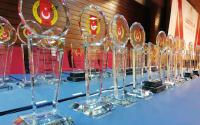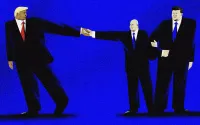There is a bleak wondrousness to this American world of ours. The Bush administration, after all, loathes fundamentalists -- those dangerous fanatics in strange lands with bizarre medieval belief systems, who wish us such ill and are more than ready to go to some twisted paradise to prove their fervor -- except, of course, for the fundamentalists here who believe that they'll soon enough be snatched away and enraptured, while the Middle East and then the world is turned into something like a giant car bomb. Our President proclaims the spread of freedom and won't let American officials sit down alone with their "axis of evil" counterparts in Iran and North Korea to negotiate nuclear dangers -- as if such contact might literally pollute them -- and yet consorting with Saudi autocrats, Pakistan's military ruler Musharraf, or the dictators of various Central Asian 'stans and their associates is unremarked upon. (Note, by the way, that one result of Bush administration military-to-military tsunami aid in Indonesia has been the official revival of relations between the Pentagon and the well-bloodied Indonesian military.)
The Bush administration calls -- quite rightly -- for the ending of the Syrian military "occupation" of Lebanon and the withdrawal of Syria's remaining 15,000 troops in that country -- an occupation, I learned only yesterday from Juan Cole (in the single best backgrounder on the Lebanese situation I've seen), that was green-lighted by Henry Kissinger himself back in 1976 -- and yet it sticks grimly with its occupation (…oops, liberation) of Iraq and considers the idea of withdrawing our 130,000 occupation troops there, no matter in what phased or timed fashion, cut-and-run heresy. (Why only the other day, Chairman of the Joint Chiefs Gen. Richard Myers was saying that insurgencies around the world tend to last… hint, hint… 7-12 years. That would, of course, involve Syrian-style staying power.) And we naturally welcome liberty, except when it comes to any of the prisoners we hold under unbelievable conditions and without rights or limit in offshore prisons around the world and even in the United States.
Just Tuesday, in our topsy-turvy world, District Court Judge Henry F. Floyd, appointed to the federal bench in South Carolina by George Bush in 2003, ruled, according to R. Jeffrey Smith of the Washington Post, that the government must charge or free the imprisoned alleged terrorist Jose Padilla because it
"lacks statutory and constitutional authority to indefinitely imprison without criminal charges a U.S. citizen who was designated an 'enemy combatant'… Using a phrase often levied by conservatives to denigrate liberal judges, Floyd… accused the administration of engaging in 'judicial activism'... Floyd said the government presented no law supporting this contention and that just because Bush and his appointees say Padilla's detention was consistent with U.S. laws and the president's war powers, that did not make it so. 'Moreover, such a statement is deeply troubling. If such a position were ever adopted by the courts, it would totally eviscerate the limits placed on Presidential authority to protect the citizenry's individual liberties.'"
Indeed.
What a world when we must rely on right-wing judges appointed by our present President for the protection of our most basic civil liberties! What a world when it's clear to such a judge that a government claim of "blanket authority under the Constitution to detain Americans on U.S. soil who are suspected of taking or planning actions against the country" is, in fact, nothing of the sort!
There was a time when I believed that, of the two famed dystopian novels of the previous century, Aldous Huxley's Brave New World and George Orwell's 1984, Huxley's was the one that best caught the most frightening tendencies in our American world. But I may be changing my mind. After all, we're now ruled by radicals who have proclaimed, in the name of freedom, that our fate is eternal war -- a.k.a. World War IV, a.k.a. the Global War on Terror -- and Americans have indeed grown relatively comfortable with a world in which "peace [ours] is war [against them]" -- or, as William Rivers Pitt writes in a thoughtful essay on American empire at the Truthout.org website, "Now, permanent war and rule by fear are accepted without question."
Pitt, like the declinist scholar Immanuel Wallerstein and Kirkpatrick Sale (in a recent essay, Imperial Entropy, at the Counterpunch.com website), believes us an empire in decline, cracking open at the seams, even threatening to collapse. Minimally, there is something remarkable in the fact that our imperial forces, in only their second sortie to war under new management, found themselves stopped in their tracks. Not quite the shock-and-awe vision of Roman legions marching across the known world. There can be little question, as Sidney Blumenthal indicated recently (and I wrote the other day), that the Europeans see us as a dangerous but weakening power and that the recent Bush trip to Europe is evidence of a new policy of "containment" -- the beginnings of a global attempt (European, Russian, Chinese) to contain the Bush administration.
Though Orwell imagined a world in which phrases like "war is peace" were statements of horror and of linguistic degradation, it might be worth asking whether a version of Orwellian language might not also hold some element of hope within it. For instance, what if, as the Bush administration seems to be demonstrating at the moment, "strength is weakness"? What if being armed to the teeth, in the end, turns out to be a brutal form of imperial disarmament? This is, in a way, one question Jonathan Schell asks as he considers our President's whirlwind tour of Europe in his latest "Letter from Ground Zero" for the Nation magazine (posted here thanks to the kindness of that magazine's editors).
Those of you who might like to explore further Schell's thoughts on America as an imperial power might check out the two exchanges he and I had last summer at Tomdispatch, or even better pick up a copy of his book, The Unconquerable World, which offers a remarkable peek inside the imperial war system as, over the last 300 years, it developed and crashed. (It's a book that, as I've said many times before, should be in every personal library.)
Finally, for any of you in or near New York City who might want to experience the live version of this, consider attending the panel discussion sponsored by the Nation Institute that Jonathan will be on this Thursday, March 3 (7-8:30 pm at the Theresa Lang Center, 55 W. 13th Street, 2nd floor). Its title is "The Deepening Shadow: The US at War in the Nuclear Age," and it's sure to offer, if you'll excuse a bad pun, more bang for your buck (at $10 a ticket, students free). After all, the other two panelists will be former war reporter Chris Hedges (author of the book I just happen to be reading, War Is a Force That Gives Us Meaning, and a man who knows the attractions that lie deep within the Orwellian idea that "war is peace"), and Frances Fitzgerald (author of the classic Vietnam-era book, Fire in the Lake, and a fine Reagan-era history, Way Out There in the Blue). I don't usually promote events, but I'm planning on going, why not you? Tom
A Less Super Superpower
By Jonathan Schell
One of the most difficult things to judge in the world today is the extent of American power. On the one hand, there is no doubt that the United States possesses a far larger pile of weapons than any other country, that the American economy is also larger than any other country's and that America's movies and television programs are consumed globally. America is widely accorded the title "only superpower," and many of its detractors as well as its supporters describe it as the world's first truly globe-straddling empire. On the other hand, it is not yet clear what the United States can accomplish with these eye-catching assets. For power, as Thomas Hobbes wrote in one of the most succinct and durable definitions of power ever offered, is a "present means, to obtain some future apparent good." Power, after all, is not just an expenditure of energy. There must be results.
Measured by Hobbes's test, the superpower looks less super. Its military has been stretched to the breaking point by the occupation of a single weak country, Iraq. Its economy is held hostage by Himalayas of external debt, much of it in the hands of a strategic rival, China, holder of nearly $200 billion in Treasury bills. Its domestic debt, caused in part by the war expenditures, also towers to the skies. The United States has dramatically failed to make progress in its main declared foreign policy objective, the nonproliferation of weapons of mass destruction: While searching fruitlessly for nuclear programs in Iraq, where they did not exist, it temporized with North Korea, where they apparently do exist, and now it seems at a loss for a policy that will stop Iran from taking the same path. The President has just announced that the "end of tyranny" is his goal, but in his first term the global democracy movement suffered its greatest setback since the cold war -- Russia's slide toward authoritarianism.
The shaky foundations of America's power were on display in the President's recent travels. Shortly before Bush landed in Brussels, Chancellor Gerhard Schröder of Germany quietly but firmly repudiated the President's militarized, US-centered approach to world affairs. NATO, he heretically announced, should no longer be "the primary venue" of the Atlantic relationship. Did that mean that Europe would continue to take direction from Washington through some other venue? Hardly: He was, he said, formulating German policy "in Europe, for Europe and from Europe." The superpower's penchant for military action was also rejected. The chancellor said, "Challenges lie today beyond the North Atlantic Alliance's former zone of mutual assistance. And they do not primarily require military responses."
Schröder was standing on solid ground at home. A poll in the German newspaper Die Welt revealed that "Vladimir Putin is seen as more trustworthy than George W. Bush, France as a more important partner for German foreign and security policy than the United States. Closer harmonization of German foreign policy with America is not wanted, either."
Meanwhile, offstage, in an apparent extension of constitution-building at home, Europe was taking the lead in building cooperative global instruments, including the Kyoto Protocol on global warming and the International Criminal Court. No sooner had the President arrived in Europe than an economic trapdoor seemed briefly to open beneath his feet when the South Korean Central Bank stated that it intended to move some of its holdings from the dollar to other currencies, causing a 174-point drop in the Dow Jones average. The next day, the bank disavowed its report and the dollar recovered, but not before the fragility of America's economic position in the world had been revealed.
In an atmosphere of programmed smiles and brittle celebrations, the presidential dinners and toasts compensated for local public sentiment rather than reflecting it. The less popular Bush was in a given country, it seemed, the jollier the summit meeting. Even in little Slovakia, where the festivities seemed more spontaneous than elsewhere, an opinion poll showed that a majority believed that the United States, not Russia, was the most worrisome threat to democracy.
In his meeting with Putin, Bush seemed almost obsequious, repeatedly referring chummily to an unresponding, scowling Putin (it's an expression that settles naturally on his face) as "my friend Vladimir." As for democracy in Russia, the man who would "end tyranny" everywhere in the world could only muster, "I was able to share my concerns about Russia's commitment in fulfilling these universal principles."
A portrait of a peculiar relationship with Europe emerged. To Bush's Don Quixote, tilting, at God's command, against imagined evils, Europe played Sancho Panza, humoring the Knight Errant but mocking him behind his back. Or perhaps it was more like that other great inverted relationship between master and servant, P.G. Wodehouse's upper-class twit Bertie Wooster and his sagacious, potent butler Jeeves, who contrives to get Wooster out of his ceaseless ridiculous scrapes in high society. The difference is that Europe's rescue is only feigned. Yes, France will help in Iraq -- with one officer, who will stay at NATO headquarters in Europe.
In history, the rise of imperial pretenders has usually led to military alliances against them. Such was the case, for instance, when a previous imperial republic, Napoleon's France, conquered most of Europe but then was defeated by an oddly assorted alliance of Britain, Russia and Austria-Hungary. Such is not the case today. Europe seems determined to bypass rather than fight the American challenge. And power? The American kind is poor in "future goods." There is rivalry in the air, but it no longer takes a martial form. Instead, Europe seems bent for now on building itself up economically and knitting itself together politically -- readying, it appears, another kind of power, based more on cooperation, both within its own borders and with the world, and less on military force.
Jonathan Schell, author of The Unconquerable World, is the Nation Institute's Harold Willens Peace Fellow. The Jonathan Schell Reader was recently published by Nation Books.
Copyright C2005 Jonathan Schell
This article will appear in the March 21st issue of The Nation Magazine.






